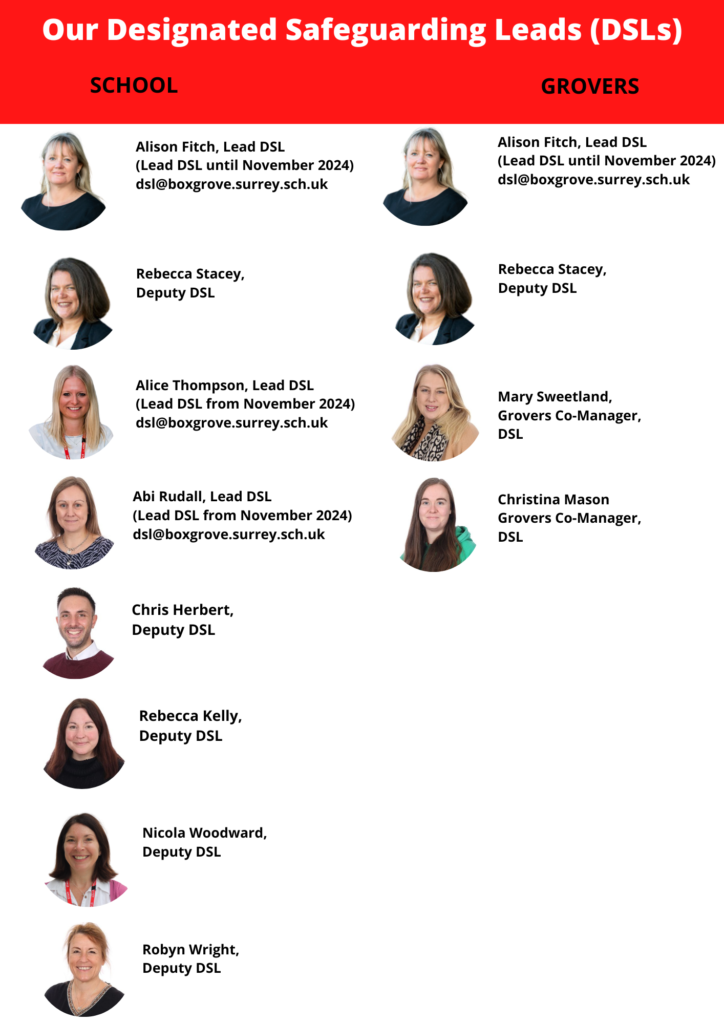Safeguarding… Everybody… Everyday
Boxgrove Primary School is committed to the safety and the well-being of its pupils and staff.
The school recognises the importance of providing an ethos and environment that will help children to feel safe, secure and respected; encourage them to talk openly; and enable them to feel confident that they will be listened to.
In order to help promote this ethos within school, we have a number of resources which provide clear information and support to all pupils and stakeholders. Please see below a list of our Designated Safeguarding Leads (DSLs).
You can contact any of our DSL’s by phoning (01483) 563701 or emailing: [email protected]

The Difference between Safeguarding and Child Protection
People sometimes wonder what the difference is between the terms safeguarding and child protection.
Safeguarding means: protecting children from abuse and maltreatment. preventing harm to children’s health or development. ensuring children grow up with the provision of safe and effective care. taking action to enable all children and young people to have the best outcomes. Child protection is part of the safeguarding process. It focuses on protecting individual children identified as suffering or likely to suffer significant harm. This includes child protection procedures which detail how to respond to concerns about a child
In practice, Safeguarding is the policies and practices that schools and Governing Bodies employ to keep children safe and promote their well-being. This means everything from security of the buildings, to the safe recruitment of staff and everything in between.
Prevent information
What is radicalisation?
It is when a person starts to support terrorism or forms of extremism that leads to terrorism.
- They are usually 13 years old or upwards but not always
- They may have a personality or identity crisis
- They may have unmet aspirations or have a personal crisis
- They may have a need for adventure or excitement
- They may feel that their culture or religion is under threat
- Individuals may feel socially isolated or suffering depression
- They may demonstrate criminal behaviour
- They may be groomed by others who promise them excitement, glory or freedom.
What are the signs?
- Overly sensitive about online viewing
- Feeling isolated or expressions of “us and them” mentality
- Becoming more argumentative or domineering in their viewpoint – quick to condemn those who disagree with their opinions
- Downloading extremism content.
- Social isolation – especially if they had been social previously
- Abnormal routines or travel patterns
- Altered appearance.
Prevent Statement
There is no place for extremist views of any kind in our school, whether from internal sources- pupils,staff,visiting adults, governors or external sources- school community, external agencies or individuals.
Any prejudice, discrimination or extremist views, including derogatory language, displayed by pupils, staff, visitors or parents will always be challenged and where appropriate, dealt with. Where misconduct by a teacher is proven, the matter will be referred to the National College for Teaching and Leadership for their consideration. Misconduct by other staff will be dealt with under normal school disciplinary procedures.
We encourage pupils to respect the fundamental British values of: democracy, the rule of law, individual liberty and mutual respect and tolerance of those with different faiths and beliefs. We ensure that partisan political views are not promoted in the teaching of any subjects in the school and where political issues are brought to the attention of the pupils, reasonably practicable steps are taken to offer a balance presentation of opposing views the pupils.
Whilst the risk posed by strangers is rare, it’s really important to make children aware of simple tips they can follow to keep themselves a little safer.
This video on Stranger Danger is designed to highlight a few key points, to be used to help you have that important conversation with your child. It is aimed at children aged 4 – 11 years. For parents/carers, families, teachers, schools and centres for young people to use to raise awareness and generate discussion that helps children keep safe.
We would advise you to talk to your child about who their safe adults are and where there are safe places near you if help is needed. It’s also important to think about safety on the internet and use of mobile phone apps and games that have ‘chat’ functions as this can be just as dangerous as a stranger in the street.
This video is one of a series of ’60 Second Security’ videos all around simple security advice. Designed to provide easy step by step tips, including advice on products and how to install and use them, helping to make you and your property that little bit safer.


